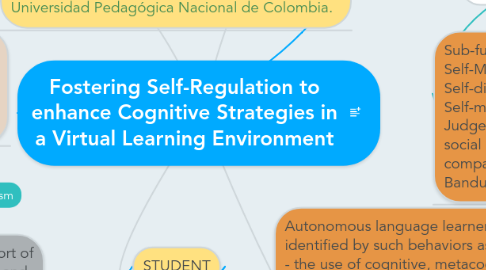Fostering Self-Regulation to enhance Cognitive Strategies in a Virtual Learning Environment
by Camilo García

1. Promote students’ self-assessment in their language skills development through teachers’ feedback.
2. Encourage language awareness through exposition to foreign culture in vloggs.
3. Enhance self-regulation through a CALL virtual learning environment in first semester students' meta-cognitive learning strategies stated in an ongoing English language learning program at Universidad Pedagógica Nacional de Colombia.
4. "Assessment could be performed in accordance to overall student pronunciation, level of vocabulary, use of grammar, and general communicativeness." (Watkins and Wilkins, 2011)
5. "A number of notable vloggs have emerged on YouTube, and students can be directed to them for extensive listening practice or for any other listening lesson in which authentic English realia is needed." (Watkins and Wilkins, 2011)
6. VLOGGS as authentic material
7. Constructivism
8. Cognitivism
9. Learning applications prepared by teachers/students or commercially produced ones such as drills, tutorials, and computer-based tasks are used in the classroom to promote collaborative learning of English skills (Beatty & Nunan, 2004).
10. Improvements detailed report of achievements, weaknesses, and suggestions for new procedures.
11. Social Support and Feedback (Zumbrunn, Tadlock, Roberts, 2011)
12. According to Pintrich and Zusho (2002) "Self-regulated learning is an active constructive process whereby learners set goals for their learning and monitor, regulate, and control their cognition, motivation, and behaviour, guided and constrained by their goals and the contextual features of the environment. (p64)"
13. Self-Regulation Promotion
14. STUDENT
15. TEACHER
16. Paraphrasing given texts to comprehend them, analyzing grammar accuracy and communication purposes, creating semantic-fields, putting meaning into context by authentic involvement.
17. Main meta-cognitive strategies: Planning, Monitoring and Evaluating.
18. According to the LYCA I Programm there must be strategies for relating, associating, and contextualizing words.
19. Enhance student's’ self-development through a set of meta-cognitive strategy in a CALL course as a virtual learning environment.
20. - Assuming language learning responsibility - Choosing language aspects to be learn - Self-practice with higher level of independence - Students are voluntarily on board of the language course - "Students innately crave self guided education" (Benson & Voller, 1997)
21. Behaviorism
22. Characteristics of CALL phases in education research (Rahimi & Yallodahi, 2011)
23. Cognitive
24. Interactive
25. Behavioristic
26. CALL, historically, envelops three phases according to Rahimi and Yadollahi (2011)
27. Autonomous language learners have been identified by such behaviors as: - the use of cognitive, metacognitive, and socio-affective strategies - awareness of language learning strategies, seeking exposure to English - the ability to self-diagnose, willingness to be responsible for learning, preparation for tutor sessions, and self-monitoring - following course materials, self-reliance, self-management, persistence in solving problems. (Vanijdee, 2003).
28. In a model of conceptual processes of self regulation and internal feedback proposed by David J. Nicol (2005)
29. From a model for self-regulated distance language learning.
30. Self-Awareness, Self-Monitoring, Self-Efficacy, Self-Evaluation, Self-Concept (Andrade & Bunker, 2009)
31. Dimensions: Cognitive, Meta-cognitive, Motivation, Behavior
32. Sub-functiuons: Self-Monitoring, Self-diagnostic, Self-motivating, Judgemental (By social and self comparison) Bandura(1991)
33. In 2009
34. In 1991
35. Social Cognitive Self-Regulated view
36. RESEARCHER


